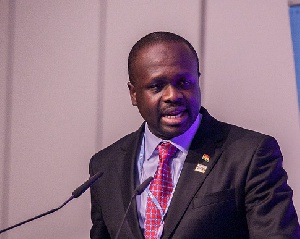The next Mahama administration, should the governing National Democratic Congress (NDC) win the December 7 polls, will not rely on borrowing to fund all the 130 promises highlighted by President John Mahama on Tuesday in Accra, Minister of Communication, Dr Edward Omane Boamah has said.
Responding to a projection by policy think tank IMANI that the next NDC administration will need to borrow US$22 billion in order to be able to implement 75 per cent of the party’s 2016 manifesto promises, Dr Boamah told Prince Minkah on Class91.3FM’s Executive Breakfast Show on Wednesday, 14 September, that public-private partnerships are “key ingredients” in attaining “these promises”.
“… And so to conceptualise the delivery of all these projects within the framework of government alone funding it is erroneous,” Dr Omane Boamah emphasised.
In a critique of the manifesto highlights presented by President Mahama, IMANI said from the ballpark costing exercise performed on the scope of the NDC’s planned projects and programmes, the party would need to spend a sum of $24 billion over and above their five-year spending average if they are to implement 75 per cent of their full manifesto.
“From an analysis of revenue growth, donor appetite for budget financing, and other net positives, $22 billion of the amount would have to be borrowed and added to the debt stock taking this country’s debt-to-GDP ratio above 100%.”
IMANI said the prevailing composite interest rate for total public debt will exceed the current effective rate of more than 9 per cent.
“With the exchange rate hovering just about 8.1, the total debt service requirement in local currency will exceed 76 billion, a crazy 19 per cent of the GDP, and an even crazier 50 per cent of all government revenues.
“The current account deficit will be in the 25 per cent range, interest rates will be galloping at 70 per cent and inflation will be hovering at 45 per cent, while domestically the government would have no choice but to start borrowing at a 60 per cent Treasury bill rate, making the 42% recorded in 2001 look rather tame.
“At these levels, inflation, weekly changes in the price of goods, shortages of fuel at the pump, rolling blackouts, and a repressive forex regime, would by now be commonplace and start feeding into the job market, as businesses rapidly downsize and investors nervously hunker in their bunkers,” IMANI said, warning: “Of course, things do not have to be this way.”
However, Dr Omane Boamah said that in addition to partnering PPPs in executing the promises, the government will also rely on development partners, the Ghana Infrastructure Investment Fund, revenues from the hydrocarbon industry, the Eximbank, the ABSA, the annual budget, and normal budget sources, “and, so, it’s not entirely accurate to be looking at it within the context of what government must borrow, in terms of what government alone must contribute”.
He said the government will also use smart borrowing strategies coupled with a firmer running of the economy in achieving the promises, adding that “IMANI’s projection is even an estimate”.
General News of Wednesday, 14 September 2016
Source: classfmonline.com

















